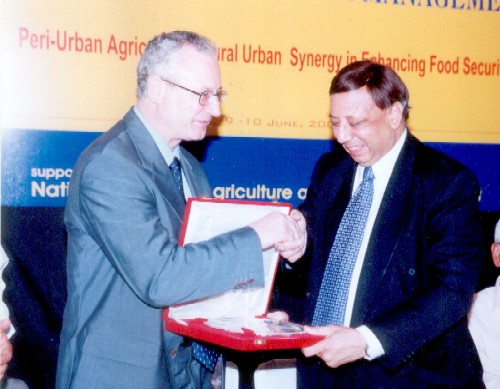09 Jun 2005-10 Jun 2005|Noida |
'Peri-Urban Agriculture: Rural Urban Synergy in Enhancing Food Security’
 Amity School of Rural Management
Amity School of Rural Management in association with
National Bank for Agriculture and Rural Development (NABARD) organized a two day seminar on
“Peri- Urban: Rural Urban Synergy in Enhancing Food Security”.
Mr. Gian Pietro Bordignon,
Country Director and Representative in India,
United Nation World Food Programme was the Chief Guest for the occasion.
Shri Sompal,
Former Union Minister of State, Agriculture & Founder Member of Planning Commission and
Dr. R.B. Singh,
Member, commission on Farmers, Government of Indiawere the Guest of Honor for the occasion.
The Inaugural session focused on the problems caused due to migration of rural population to urban areas. This not only creates tremendous strain on civic services but also results in shortage of food to feed the burgeoning urban population. The shifting population is putting extra pressure on agricultural systems and the environment. Despite of India’s remarkable early achievement of becoming self sufficient in food grains, it is today experiencing the paradox of persisting hunger and malnutrition.
In session- I: The Chairperson and Rapporteur were
Mr. R. K. Ahuja, Former Dy. Regional Director for Asia, United Nations World Food Programme and
Prof. V.P. Tipathy, Director, Deen Dyal Upadhyaya Institute of Rural Development, Agra respectively. The key characteristics of the peri-urban areas were highlighted. The traditional livelihoods have been destroyed and land holding patterns have changed in peri-urban areas. Many poor families mortgage their land and assets, and become food insecure and vulnerable. On the other hand new livelihoods have emerged. Some entrepreneurs weave success stories as they respond to new opportunities
In session- II: The members present deliberated on
Policy Issues in Rural-Urban Synergy. The Chairperson for the session being Prof. (Dr.) Amerika Singh, Director NCIPM and Dr. S. K. Singh, IARI, New Delhi being the rapporteur. The concerns regarding the peri-urban agriculture are many. The high-value crops are prone to pest attacks, vulnerable to irregularities in irrigation, vagaries of weather, environmental pollution and market fluctuation.
,br>
The second day of the seminar started with session- III. Prof. R.C. Saxena, Chairman, NEEM foundation India was the Chairperson and Dr. V.S.Raju, the rapporteur. The topic of deliberation was ‘Resource Management’.
In session IV the discussion was on
‘Emerging Potentials’. The chairperson was
Prof. V.P. Tripathi, Director, DDUIRD, and Agra. Peri-urban agriculture offers several opportunities. Their proximity and good connectivity to urban markets holds enormous potential for growth, also there is lesser need for storage and refrigeration, which brings down the cost factor. The urban consumers demand high- value high-quality products which fetches high incomes.
The concluding session-V focused on
‘Technological Innovations’ and was chaired by
Dr. T.P.Trivedi, NICIPM .Dr. T. K. Bahera, AIRI acted as the rapporteur for the session. In this session new technologies including packaging systems were discussed. The final discussion and recommendation was chaired by
Mr. S.P.Jakhanwal, Director - ASRUM. The whole discussion was based on farming practices which being intensive and heavy on chemical inputs, is not environmentally sustainable in the long run and often cause more damage to the environment. Coupled with this the high pollution levels and contamination of water as well as agricultural produce poses considerable health risks for producers as well as consumers.
Valedictory session was addressed by
Chief Guest, Dr.Daniel Gustafson, FAO Representative in India & Bhutan. He appreciated the attempt made by Dr. Rini Sen, Asst. Director, AS